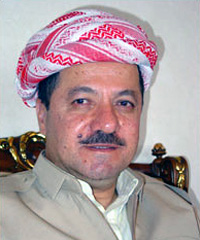Opposition posts gains in Iraqi Kurdish elections
 Arbil, Iraq - A union of the two parties that have for decades defined Kurdish politics in Iraq won a comfortable majority in parliamentary and presidential elections, but the opposition made unprecedented inroads according to preliminary results announced Monday.
Arbil, Iraq - A union of the two parties that have for decades defined Kurdish politics in Iraq won a comfortable majority in parliamentary and presidential elections, but the opposition made unprecedented inroads according to preliminary results announced Monday.
The initial results of Saturday's elections showed Kurdish incumbent President Massoud Barzani winning a landslide victory, with roughly 70 per cent of the vote. A coalition of his Kurdish Democratic Party (KDP) and Iraqi President Jalal Talabani's Democratic Union of Kurdistan (PUK) won roughly 55 per cent of seats in the new parliament.
The opposition movement Change, led by breakaway PUK member Nawshirwan Moustafa, won 26 of the 100 elected seats in parliament. An additional 11 seats are reserved for ethnic and religious minorities.
The bulk of Moustafa's votes came from his hometown of Suleimaniya, where thousands had attended his rallies.
Opposition politicians and their supporters on Sunday charged they would have posted better results had the ruling parties not bussed in voters, some of whom were unregistered.
Shortly before dawn on Monday, "hundreds" of ruling coalition supporters attacked the headquarters of the opposition Kurdisan Islamic Alliance, KIA politburo member Mohammed Faraj told the Aswat al-Iraq news agency.
But the Independent High Election Commission, the Iraqi government and the UN Mission in Iraq all praised the elections as a success, noting that voter turnout was close to 80 per cent.
While the opposition parties and the ruling Kurdistan Alliance coalition have been at odds over local politics, both sides support Kurdish claims to the disputed land and petroleum resources outside the current borders of the semi-autonomous Kurdish region of northern Iraq.
The Kurdish parliament last month approved a draft constitution that defined the borders of Kurdistan as including parts of what is currently outlined as the provinces of Nineveh, al-Ta'mim and Diyala.
Al-Ta'mim, with its oil fields worth millions outside Kirkuk, has long been a source of sore dispute between Arab and Kurdish Iraqis. Former Iraqi president Saddam Hussein's government systematically sought to change the demographic composition of the city by forcing Kurdish residents to leave and resettling Arab Iraqis to the city.
Article 140 of the Iraqi constitution, by way of enshrining an article of the administrative law the transitional government instituted after the 2003 US-led invasion, mandates that the Iraqi government "shall act expeditiously to take measures to remedy the injustice caused by the previous regime's practices in altering the demographic character of certain regions, including Kirkuk."
But the law also defers "permanent resolution of disputed territories, including Kirkuk" until after a series of measures have been taken to accomplish those goals, and until "a fair and transparent census has been conducted."
The Iraqi government has yet to carry out such a census, and Prime Minister Nuri al-Maliki last week called the Arab-Kurdish territorial dispute "one of the most dangerous issues that have been a concern for ... the Iraqi government."
In Nineveh, the site of near-daily fatal attacks, political tensions between the Arab nationalist government and the Kurdish parties it replaced have been rising as well.
Athil al-Najifi, who led the Hadbaa coalition to victory on a platform of taking control of the province back from the Kurds, has vowed to rid the capital, Mosul, of Kurdish militias, and has called the border regions of the province "lawless" because of the sway they hold there.
Officials from the Kurdish Regional Government's Ministry of Peshmerga militias has dismissed his statements as beyond his remit, saying security in the border provinces is subject to agreements struck by the central government in Baghdad with the Kurds and the US military, which continues to operate in the area.(dpa)